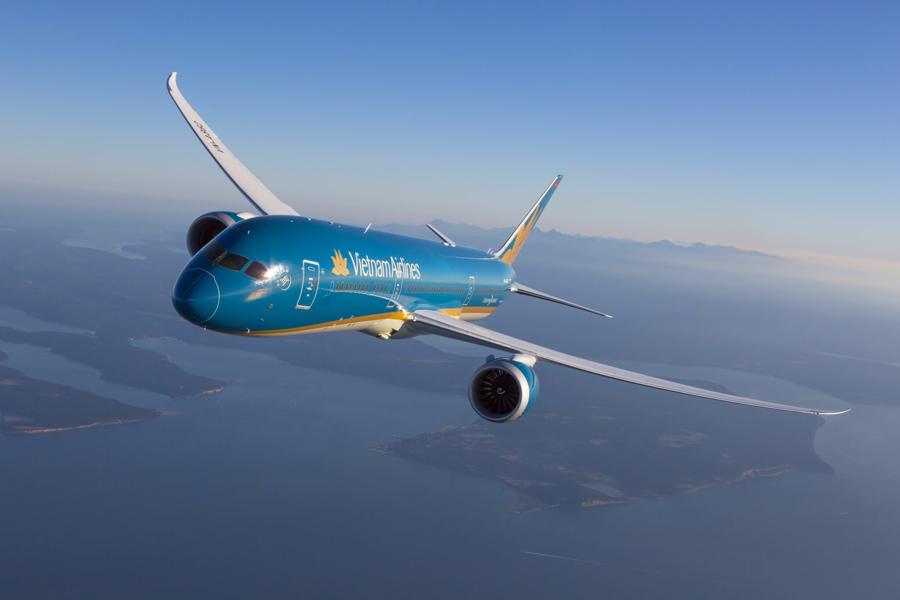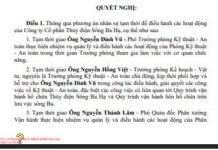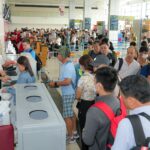SELF-RELIANCE AND RESILIENCE IN THE FACE OF CHALLENGES
Recognizing the need for an early recovery from the aftermath of the Covid-19 pandemic, which impacted the aviation industry as a whole and VNA in particular, Mr. Le Hong Ha, CEO of VNA, shared that the airline has restored its entire domestic network and most of its international routes, while also launching 7 new international destinations in recent times. Currently, VNA serves over 90 destinations worldwide, including 60 domestic and 30 international destinations, connecting to more than 20 countries.
Attributing this positive outcome to VNA’s strategic approach, Mr. Ha explained that the airline has undertaken a comprehensive restructuring of its assets, capital, and human resources, while also enhancing aviation safety and service quality. Over the past three years, VNA has reorganized its structure, implemented cash flow management solutions, and negotiated with partners to reduce costs.
Specifically, during the period of 2020-2023, the airline’s total cost savings amounted to more than VND 18,000 billion. They successfully negotiated rent reductions from 2021 until the end of the lease term, totaling over VND 16,000 billion, and deferred rent payments from 2020 to 2026, amounting to over VND 8,000 billion.
Additionally, VNA restructured debts worth a total equivalent of over VND 6,000 billion to alleviate financial pressure. The company also meticulously reorganized its apparatus and workforce. Vietnam Airlines Group reduced 4 levels of units and 51 department-level units. In 2023, labor cost savings exceeded VND 2,000 billion compared to 2019.
With a thorough restructuring of corporate governance and flexible business operations, VNA’s consolidated revenue for the past 9 months reached over VND 85,466 billion, an increase of more than 24.64% compared to the same period in 2023. The consolidated after-tax profit exceeded VND 6,263 billion. Notably, in Q3/2024, the consolidated after-tax profit reached VND 862 billion.
However, the prolonged impact of Covid-19 has also presented challenges and negatively affected VNA’s overall operational plans and business activities. As of the end of 2023, the airline still had negative equity of over VND 17,026 billion. The aviation market continues to face prolonged challenges, including political conflicts, exchange rate fluctuations, unfavorable fuel prices, engine recall issues, and increased costs for materials, spare parts, maintenance, and aircraft leasing.

CRUCIAL SUPPORT NEEDED TO SAFEGUARD FINANCIAL HEALTH
According to Mr. Dinh Viet Thang, Director of the Vietnam Aviation Authority, VNA’s recent positive operational results are not sufficient for the company to overcome its difficulties and fully recover from the aftermath of the Covid-19 pandemic. He noted that VNA’s financial indicators have not returned to a safe threshold and continue to reflect a high-risk assessment rating. This presents a significant challenge for VNA’s efforts and limits their access to socio-economic resources needed to strengthen their financial capacity.
Given this situation, Mr. Thang emphasized the need for additional support and facilitation for VNA’s operations, in accordance with legal regulations and policies from relevant authorities. This includes finalizing and approving the implementation of a comprehensive solution proposal to address VNA’s challenges stemming from the Covid-19 pandemic, particularly focusing on financial resource supplementation, liquidity improvement, cash flow stabilization, and the development of a specialized aviation service complex at the Long Thanh International Airport. He also mentioned the importance of extending support policies related to taxes, fees, interest rates, and debt restructuring.
Mr. Dang Ngoc Hoa, Chairman of VNA’s Board of Directors, acknowledged that the path back to stable growth levels, as seen before the pandemic, is a long and challenging one for Vietnamese airlines, including VNA. He emphasized that the most crucial solution at present is to remove institutional bottlenecks to enable the airline’s sustainable recovery and development. This includes the approval of the comprehensive solution proposal to address not only immediate challenges but also to prepare for future growth. He also highlighted the need for supportive policies for the aviation industry regarding environmental taxes, landing and takeoff fees, and additional capital sources.
“The state needs to promote decentralization and delegation of authority to empower businesses to be more proactive in production and investment project decisions,” said Mr. Hoa, acknowledging the reality of global competition, where it’s not just about ‘big fish eating small fish’ but also ‘fast fish eating slow fish.’
Mr. Nguyen Duc Kien, former Head of the Prime Minister’s Economic Advisory Group, noted that the recovery trend amid challenges requires leading enterprises like VNA to strive for optimal conditions to lead the entire Vietnamese aviation ecosystem’s recovery.
“VNA can only achieve this goal by consistently and timely implementing the necessary sets of tasks and solutions,” Mr. Kien assessed. “Any solution that cannot be implemented or is only partially or slowly executed will directly affect VNA’s recovery capabilities.”
The Heavy Aftermath of Twin Impacts and Vietnam Airlines’ ‘Major Surgery’
The dual impact of the COVID-19 pandemic in 2020 and the unfavorable geopolitical landscape has dealt a severe blow to global aviation, with Vietnam’s aviation industry particularly hard-hit. Vietnam Airlines, in particular, faces a critical juncture; without swift and decisive action to improve its financial position, the airline risks insolvency and a shortage of capital.
Unlocking Vietnam Airlines’ Troubles: A Strategic Approach
On the afternoon of November 25, the National Assembly will hold a discussion on solutions to continue overcoming difficulties caused by the COVID-19 pandemic and enable Vietnam Airlines’ early recovery and sustainable development.










































